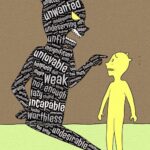We all have some version of an inner critic, that voice or part of us that harshly judges us for something we’ve thought, felt or done. This inner critic might only emerge from time to time, depending on circumstance; or this critical inner voice can feel unrelenting and hostile, rarely softening its edge.
It might reprimand you for something you’ve done (missing an important work meeting because you forgot to set your alarm), or this inner critic might judge who you are as a person and make demeaning, sweeping statements about you (“Obviously you haven’t amounted to much; what did you expect?”).
Not all inner critics are alike. You might find some manageable degree of self-criticalness motivating, a voice that encourages you to do better (how ever you define “better”); a no-nonsense part of you that might be modeled on a parent, teacher or coach who expected more from you, someone who offered feedback that challenged you—without diminishing you—when you missed the mark.
However, the inner critic we are focusing on in this article doesn’t motivate. In fact, this hypercritical part of you most likely holds you back and diminishes you in significant ways.
The inner critic’s impact
The psychological fallout of living with a harsh inner critic is substantial, and ultimately, can affect those around you as well (albeit more subtly, and in different ways). This part of you can dampen your experiences of fulfillment and satisfaction. Positive emotions might trigger a severe backlash from the critic so that the good feeling vanishes before you can enjoy it. Contentment and joy are fleeting at best. When an inner tyrant is waiting in the wings to critically pounce on anything it perceives as you veering off the narrow, safe path it has set out for you, you can see how poor self-esteem, low self-confidence, and a lack of motivation are natural by-products.

Some inner critics are loud and take center stage in ways that are hard to miss. In these instances, you can feel battered by repetitive self-attacking thoughts. The inner critic is well aware of your desires and vulnerabilities, and may not hesitate to hone these attacks in an effort to cause the deepest hurt.
However, inner critics are not always easily identifiable. The self-attacking part of you may have gone underground and may be relatively quiet (though not inactive). This is the result of self-adjustments that you’ve made early in your life in order to deal with the negative fallout of your inner critic. You learned how to navigate your life in order to mitigate self-criticism. To adjust to such an unfriendly inner environment, you may have made yourself smaller—a shrinking of the self that includes the disconnection from wants and desires; the locking away of parts of yourself that may hold shame and pain.
Within yourself, you learned to carefully exist in a narrow psychological lane to avoid evoking the ire of your inner critic. If one or both of your parents/caregivers mistreated you, you may have spent a lot of time locked in your bedroom in order to avoid them. You minimized painful contact with them by isolating. You may isolate from yourself in a similar way by narrowing what you allow yourself to think about, by hiding from what you desire, by not trying new or challenging activities, all in an effort to quiet your inner critic.
Purpose of the inner critic
You weren’t born hypercritical. Rather, this is a learned behavior with a function: it served a particular purpose in the context of your life growing up. The shape and intensity of your inner critic emerged out of the relationships with your primary attachment figures. How you related to yourself—and to the different parts of you as well as to your emotional life—resulted from how others related to you early in your development.
And once this critical inner voice becomes a member of the cast of characters that make up your personality, it takes on a life of its own. This part of you may not sound like or remind you of any of the harsh or hypercritical caregivers you grew up with. It might feel like you’ve always been self-critical, a familiar way of being that you never questioned or tried to change. In some ways, it may feel like the inner critic is you, that it’s not just a part of you, but rather, it’s unchangeable and it’s you speaking truth to yourself (and despite that very common feeling, it is not true—any inner talk that attempts to tear you down is not an inherent part of yourself).
You might already have learned that trying to bypass or go head-to-head with your inner critic does little to silence it.
The most important step in changing this part of yourself is by developing a new and different relationship with your inner critic. You might already have learned that trying to bypass or go head-to-head with your inner critic does little to silence it. In fact, it may double down on its harshness when you approach it argumentatively.
So rather than avoiding or doing battle with this self-critical part of you, let’s try to understand what might be keeping your inner critic vigilant, overly active, and at odds with the things you want to get out of your life.
Protector
The inner critic often stands guard and pounces when it feels like you’re making yourself vulnerable, placing yourself at risk in some way. This part of you wants you to stay safe, and that means avoiding embarrassment, disappointment, rejection, failure, humiliation. . .even if you’re willing to risk those things in doing something you feel excited about (a new job, a new business, a new relationship, a creative endeavor). Here the inner critic is being preemptive, keeping the vulnerable parts of you under its watchful gaze.
In this dynamic, the aim of the inner critic is protection even though its means are extreme (harsh verbal attacks, self-injury, self-sabotage, self-destructive behaviors). It’s like an overwhelmed parent who screams and berates their child for running into the street. This verbal attack comes from fear and is designed to keep the child safe; the primary purpose of this jarring parental response wasn’t to diminish and make the child feel awful about themselves (even though the child may have ultimately felt humiliated or diminished by the parent’s reprimand).
Taking this example one step further, someone who feels overwhelmed, insecure or inadequate as a parent may quickly fall back on sternness even when their child isn’t in physical danger. This more pervasive parental criticalness may arise out of a lack of self-trust as a caregiver and out of a lack of trust in the child’s emerging capabilities. The inner critic also lacks trust, a distrust in your ability to keep the younger parts of you safe (safe from outside dangers as well as internal dangers).
It is this lack of self-trust that keeps the self-critic (in the role of protector) alive. This inner critic/protector is making sure that you don’t metaphorically run into traffic, and it doesn’t trust you to navigate busy streets on your own.
Masochistic relating
The logic of masochistic relating takes the following form: because of early abuse and unhealthy family of origin dynamics, you learned that emotional pain and suffering are inevitable. This isn’t inherently problematic since the slings and arrows of life cannot be avoided.
It is this pairing of pain with need satisfaction that turns problematic…
You’ve also learned, however, that in order to get what you want, to have certain needs met, you must first endure some form of emotional or physical pain. In short, getting what you want comes at a heavy emotional cost to self. It is this pairing of pain with need satisfaction that turns problematic; a pairing that is deeply internalized and difficult to notice. You might feel like it is your fate, an unquestioning truth that plagues you. It’s not the struggle of hard work to achieve certain ends that is being addressed here. The ability to challenge yourself and work to achieve goals is expected. It is healthy. The masochistic pairing of suffering with need satisfaction is a different phenomenon. It arises out of a profound helplessness in the face of suffering.
While there are devastating external events that cause us great pain, what is being highlighted in the dynamic of masochistic relating is the inner critic’s role in bringing about a certain level of suffering. It represents a repetition of childhood traumas and family-of-origin dynamics. You’ve learned to mistrust fulfillment and satisfaction without some level of distress.
Loyalty to early abusers
Children are primed to form strong attachments to their caregivers. This innate dependency on them is a given. Research on attachment shows that children may become even more attached (clingy) to caregivers who mistreat them. With mistreatment, the child becomes increasingly vigilant of their caregiver’s moods and needs, a watchfulness designed to help navigate the dangers ahead.
The burden of being vigilant to the caregiver is in conflict with the unfolding needs of the child. When caregivers are reliable in meeting their child’s needs, they become a secure base from which the child can securely launch. Over time the child psychologically separates from their caregivers, buoyed by the knowledge that they can safely return when needed. This allows the child to confidently explore their environment and world.
…the child may have no choice but to forgo their own needs, to suppress their authentic strivings in order to placate the adult(s).
With the polarizing dynamics created by erratic or abusive parenting, the child may have no choice but to forgo their own needs, to suppress their authentic strivings in order to placate the adult(s).
Attachment to the abusive or neglectful caregiver can turn into a fierce loyalty. This loyalty is often unconscious and manifests in how we relate to ourselves and engage in the world. One way this loyalty plays out is to be hypercritical of yourself in ways that parallel your parent(s) criticalness of you. In these instances, you’ve internalized their voice. They continually show up within you whenever you attack yourself.
Another way this loyalty can manifest is by squelching aspects of yourself that were problematic for your parent(s). For instance, if your independence seem to threaten them (for example, you noticed your mother or father becoming sullen or withdrawn in reaction to you having separate interests or friends). To assuage their dissatisfaction, you may have learned to shut down your autonomous strivings by becoming critical of the independent parts of you. In this way, you continue to be the child they needed you to be through an ongoing self-sacrifice, a contorting of yourself that was learned long ago.
~~~
As described above, it can be helpful to think of the inner critic as a part of you—but just one part amidst other segments of self that make up the person you are. Increasingly, different therapy approaches (for example, relational psychodynamic therapy, Internal Family Systems, trauma and dissociation informed psychotherapies) have been speaking a similar language of self-multiplicity, rather than a singular, unitary self.
From the perspective of multiplicity, the inner critic doesn’t exist in isolation. That part of you exists in relation to your other self-states. To more completely understand your inner critic, it is important to discover the relationship that this self-critical part of you has with your other self-states. This can be slow work, and often it’s wise to approach it carefully in order to avoid threatening the inner critic and provoking it into even more extreme and exhausting attacks. But despite the gradual nature of the work, it can be incredibly meaningful and well worth the time and effort.
Understanding the origin of your inner critic and the current function it plays in your inner life (beyond the idea that it is merely a sadistic part of you intent on tearing you down) can be an important step in creating a more friendly emotional world, one that feels more aligned with your goals and desires.
~~~
Rich Nicastro, PhD is a clinical psychologist who works with individuals and couples. He offers teletherapy sessions to clients throughout the United States.





